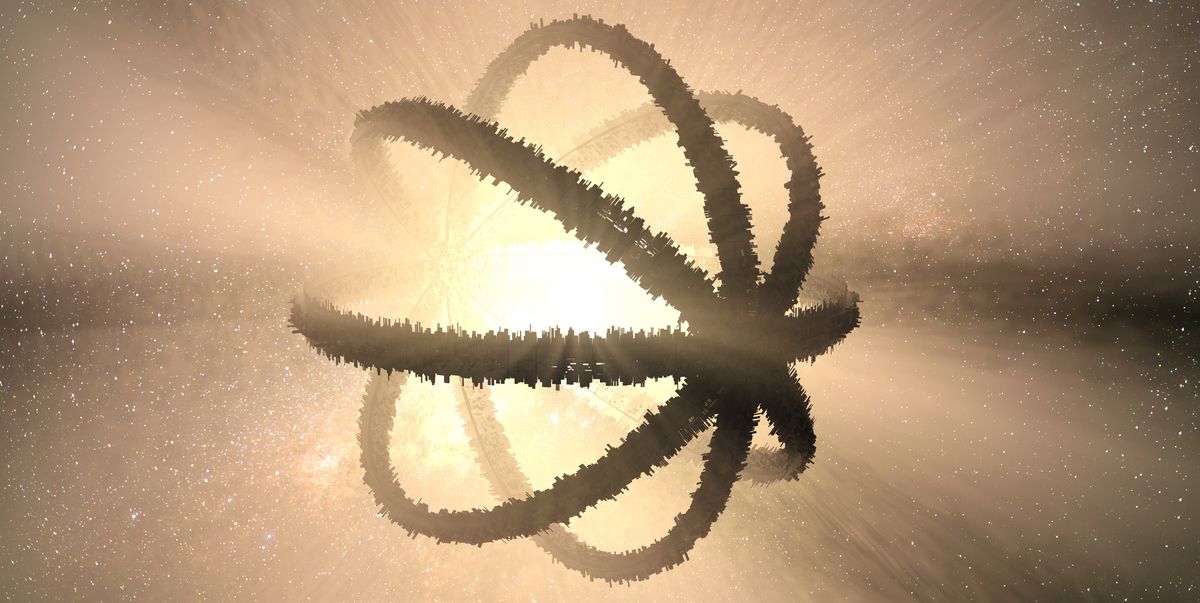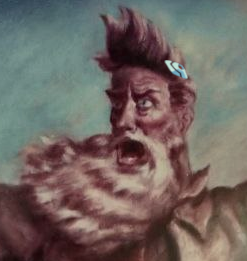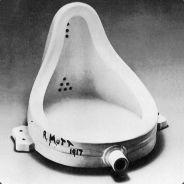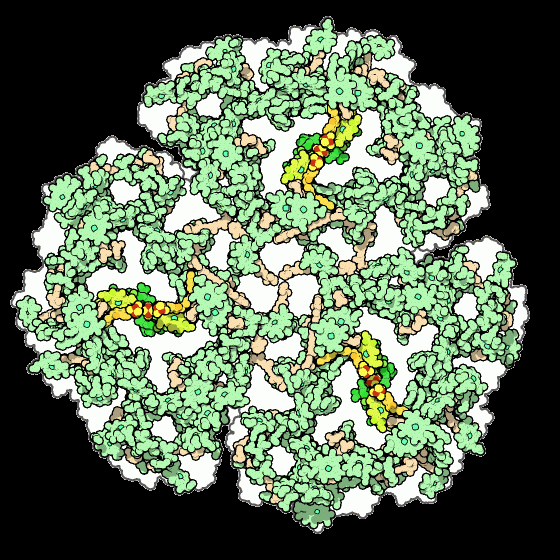Imagine this: In the far, far future, long after you’ve died, you’ll eventually come back to life. So will everyone else who ever had a hand in the history of human civilization. But in this scenario, returning from the dead is the relatively normal part
something something science as the new religion
This article is a summary of a paper by two Russian dudes that starts with explaining the ideas of Russian cosmism. Fedorov came up with the idea that to fullfull the Christian prophesy scientists would figure out the way to ressurect everyone who's ever lived, but because that's a lot of people we also need to colonise other planets for them to live there. Fedorov was a mentor to Tsiolkovsky, got him interested in space travel and rockets.
but in a really cool way though, i love big wobbly space rings
I hate this. It basically comes down to "oh you didn't share everything about yourself on social media so you'll come back an emotional cronenberg and have to live a fake life"
They already figured it out in the TNG episode relics. They encounter a Dyson sphere and Scotty came back from being presumed dead.
One of the great "discover something that fundamentally alters enormous parts of the show and then never talk about it again" episodes.
There's a commentary track on the blu-ray where they talked about how the Dyson Sphere really should have gotten its own episode with better focus and not a B plot for this one. They definitely regret pissing that one away.
cause if you make a copy of something that first thing and second thing are still independent of each other.
a copy of your consciousness will exist, but it wont be YOUR consciousness.
your consciousness is a result of drugs produced by your brain.
Neal Stephenson wrote a sequel to Reamde 2 years ago titled "Fall.. or Dodge in Hell" that goes in on the topic of your conversation. Extremely trippy thought experiment that assumes that having mapped out your neural map in full, and actively simulating your brain could register consciousness in a virtual sandbox. It explores the power struggle experienced when managing the power consumption of this simulation, and how this impacts the resources and politics of organic life on earth as it is shaped by a cloud computing monolith in which all people have the opportunity to join the digital hive.
Not sure if Neal is considered reactionary because his insights often do stray towards lolbertarian ego, but he usually remains restrained materially.
I guess I don’t really see how the same logic doesn’t apply to an actual human brain, which itself is basically an organic computer
Ok well, I disagree. And the article hasn’t changed my mind
By viewing the brain as a computer that passively responds to inputs and processes data, we forget that it is an active organ, part of a body that is intervening in the world, and which has an evolutionary past that has shaped its structure and function.
No, you don’t have to forget any of that to understand the brain as a computer, it just makes it a more complicated one.
I really just disagree with a lot in this essay, it seems like most of the “the brain is nothing like a computer” argument comes down to strictly limiting the definition of a computer to only include certain digital computers already developed by humans. At least the author seems to acknowledge that his opinion about consciousness being impossible to ever replicate with technology is one that a lot of scientists disagree with.
Is it though? It's a common assumption but it's far from confirmed, our current models of consciousness are very rudimentary despite what techbros would like you to believe.
Check out this article: https://iai.tv/articles/consciousness-cannot-have-evolved-auid-1302
I’ve kind of already had this conversation in this thread including reading some articles by that author, I’m not really convinced by him, and I think that his ideas rely just as much on assumption, if only different ones.
Can you explain why? I've yet to see a convincing rebuttal to the argument I linked, I'd like to hear it.
Tbh I’m a bit surprised you find that argument convincing to begin with, there are a number of issues with it that jump out at me
our ability to subjectively experience the world and ourselves—is no exception: it, too, must give us some survival advantage, otherwise natural selection wouldn’t have fixed it in our genome.
First this, the premise of the entire argument, is not true. This is not how evolution works, and the entire argument is based on this incorrect idea about evolution.
A lot of the rest of it is semantic sleight of hand. Like
There is something it feels like to see the colour red, which is not captured by merely noting the frequency of red light. If we were to tell Helen Keller that red is an oscillation of approximately 4.3*1014 cycles per second, she would still not know what it feels like to see red.
The “something it feels like to see the colour red” not being the same thing as the wavelength of the color red doesn’t mean that both things aren’t the result of material reality. He’s making one argument “the feeling of seeing the color red is different from knowing the physical quantities that make the color red” (which is obvious) and passing it off as another argument “the feeling of seeing the color red is immaterial”, which he doesn’t actually offer any support or evidence of.
Ultimately buying into his argument requires rejecting materialism, but he’s more or less just asserting that consciousness is this thing that can’t be the result of material reality, I don’t see any convincing argument in support of this assertion.
Not speaking for AnarchoMalarkeyist, not sure what they had in mind but IMO it's because a physicalist solution to the mind-body problem doesn't really make sense when you think about it.
I think the most damning argument against mind-body physicalism is this and I've yet to see a proper rebuttal: https://iai.tv/articles/consciousness-cannot-have-evolved-auid-1302
Basically consciousness cannot possibly be generated by or equal to physical stuff, so any kind of purely physical model of the brain wouldn't produce consciousness.
like no i am good we could try to not bound a star to our will with an extremelly evil looking machine
This article is dumb but a dyson sphere/swarm is cool and probably feasible
like i am goofing because they picked just the most ominous image possible but yeah it is and it is cool to trully harness the power of the sun in the same sense we did to the atom i get it
like would it look less or more evil if it had like billions of statues on the surface of the machine to trap the sun
They've realized Elon Musk isn't going to invent an immortality serum and they need to move on to Plan B.
I mean, you won't be coming back from the dead. It would be akin to a clone of you, containing your memories. But the neurons and cells that comprised you will still be dead as fuck.
While I agree with the semantics of this, you know what I was saying lol. The new 'you' will lack your consciousness or what have you.
no it's definitely a replica, the old one was destroyed entirely and rotted away like 30,000 years before the sphere dumb ass
But, what if we gradually replaced small amounts of neurons and let the brain adapt over time, that's an interesting thought experiment
If you had a non-conscious coma for a few days but came back fully after, did you die and is the next person inhabiting your body not you? Many of your cells will die and be replaced - neurons are a notable exemption - yet you are still you and call your meat your body no matter how many cells are replaced. But, surely, even your neurons will replace the atoms that make it up over time. You can never step in the same river twice and all that, you will never have this EXACT configuration of atoms and cells that you do right now. But you wouldn't hesitate to recognize you as a continuation from yesterday to tomorrow despite this. And at a high level, you recognize yourself in a photo in the past even though you and that person may have different memories (certainly, current you has more than yesterday you) so in order for "you" to be around you don't even need exactly the same memories. At varying levels, we all accept that you don't need things to be exactly the same in order for your "youness" to be recognized (you don't need the exact same atoms, you don't need precisely the same cells, you don't need exactly the same network of neurons, etc.)
If the only thing that counts as you is this particular configuration, then why couldn't you bring someone back from the dead? If all you are is quantum state vectors and some function over time describing their change, why do those have to be computed by the physical universe instead of a dyson sphere? In this view, "you" isn't a process that has to be unique and sequential, "you" could be distributed and parallel - there can absolutely be many of "you" running around all with equal claim of being you.
There is something to the fact that we are all doomed to die and even if we survive this century and go on to construct technological wonders that can resurrect us in 1000 years, we will have lived and died and something will have been lost in the intervening time. Even if we can't exactly put our finger on what... a soul? The continuity of consciousness? Something does indeed seem to be lost.
Is there some place you can sign up to get cremated automatically?
But also, a digital model of a biological brain (that doesn't have billions of weird glitches) is impossible, change my mind.
Why would be digital model of a biological brain be impossible? There are already digital models of small parts of brains of varying degrees of accuracy.
What about the brain is not modelable? It clearly exists in the physical universe and we clearly have the capacity to simulate physical things to different degrees of approximation. You might not be able to simulate a mind on a thumb drive but you can drill down all the way to simulating every quantum state vector in the volume of a human mind and nervous system if needed and just slow down the internal computational clock. Maybe you need a computer the size of a warehouse and a digital second of thought might be the equivalent of a year to us, but it doesn't seem impossible to simulate the physical system of the brain from first principles.
Getting a model of a brain from a living or dead human seems like it might be impossible. No idea how you could scan or image someone's total brain.
This is basically the ending to The Light of Other Days (which was apparently itself borrowing from the ideas of one Nikolai Fyodorov) but with a Dyson Sphere thrown in for the hell of it.
Nikolai Fyodorov was a Russian dude that died prior to the revolution, but he figured way back in the late 19th century that it is in fact Humanity's common task to eliminate mortality. He was even more radical than merely giving everyone currently alive immortality, he also thought there must be a scientific, material way to resurrect previously dead humans.
Kinda neat that those ideas are still around.
Most people here are arguing whether a computer simulation can be you, but even if it can (the idea I'm partial to), how much "you" can you get just of of recordings left by you? Seems like too sparse of dataset even if you post a lot. There was a Black Mirror episode with this exact premise. "Be right back" or something.










